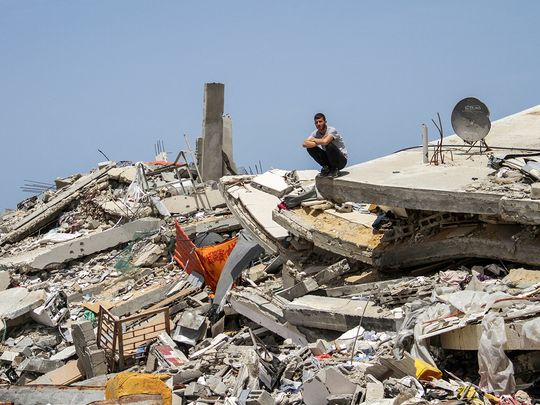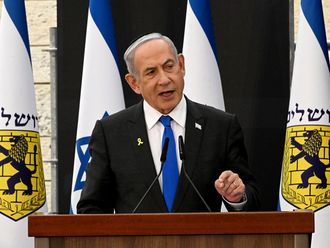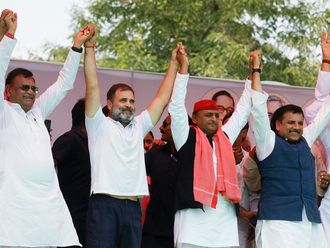
In its March/April issue, the American Foreign Affairs magazine, which holds sway over American elites and potentially European audiences, featured a series of opinion articles delving into recent events in the Middle East, particularly focusing on the latest developments in Palestine.
The magazine prominently showcased two notable articles. The first, titled “The Strange Resurrection of the Two-State Solution,” authored by Martin Indyk, former US ambassador to Israel and seasoned peace negotiator during the Bill Clinton administration, who played a pivotal role in drafting the first meaningful agreement between Israelis and Palestinians.
The second article, titled “Only the Middle East Can Fix the Middle East,” was penned by Dalia Dassa Kaye and Sanam Vakil, both Middle East researchers at US-based think tanks. Additionally, the magazine featured another article titled “Israel’s Self-Destruction,” written by Aluf Benn, editor-in-chief of the Israeli newspaper Haaretz. In his piece, Benn concludes that prosperity is unattainable without peace with the Palestinians.
The magazine’s focus on the two-state solution underscores the prominence of the Palestinian issue in discussions within global political spheres concerned with matters of war and peace. This heightened attention comes against the backdrop of the unjustifiable killings of Palestinians in Gaza.
The world public opinion is no longer focusing on Hamas’ actions. Instead, the world is now focused on a more pressing issue: How many Palestinians will Israel kill? How long will these massacres be tolerated?
“If you strike, we will strike back”
The regional scene is becoming increasingly clear: the Iran-Israel dossier has reached a stalemate following recent escalations. Iran’s attack on Israel was amplified by its supporters but downplayed by Israel and its allies. Conversely, Israel’s retaliatory strike on Iran was minimised by Tehran and its allies but exaggerated by Israel and its allies.
Both sides employed tactics of exaggeration and underestimation to appease their respective people. The question remains: Will Iran continue to advocate its proxies in the Arab neighbourhood to launch skirmishes that threaten peace? This is not an Israeli obsession, as long as it is within the limits of the game of what is known as the “rules of engagement”.
The lesson is clear: Any party that breaches these rules will face consequences, even if it is an Iranian party. The underlying message is simple: “If you strike, we will strike back.”
With upcoming elections and the ongoing conflict in Ukraine, the US is unlikely to intervene significantly unless its forces in the region face a large-scale attack, which is deemed improbable.
Additionally, while Washington continues to support Israel financially and militarily, its direct involvement beyond this role seems limited. Consequently, as the conflict in Gaza prolongs, the potential for its expansion looms larger.
This brings us to Arab diplomacy, which has begun to take meaningful steps towards various initiatives. The second article points to several key topics, including the resolution of the dispute with Qatar, diplomatic engagement with Iran to mitigate tensions, the expansion of relations with Eastern countries, encompassing both economic and political dimensions, particularly with China. Additionally, it underscores the importance of maintaining a balanced approach in relations with Russia.
Arab countries are increasingly diversifying their regional engagements, moving away from reliance solely on traditional American security arrangements.
Instead, they are actively exploring alternative avenues, exemplified by their participation in conferences such as the Baghdad Cooperation Conference 2021 and the subsequent conference in Oman in 2022, which saw the involvement of Tehran and Ankara, among others.
Arab countries have also engaged in various regional initiatives, including participation in forums such as the Middle East Gas Forum, which saw involvement from Cyprus, Egypt, Israel, Greece, Jordan, France, and representatives of the National Palestinian Authority.
Notably, the Arab world has taken significant strides towards regional cooperation, exemplified by the historic Abraham Accords between Israel and several Arab countries. These initiatives underscore the Arab nations’ commitment to forging security partnerships, with or without direct involvement from the US.
Theoretically, the article suggests that the events in Gaza since Oct. 7, 2023, may have temporarily stalled progress on this path. However, the true test lies in the aftermath of the Gaza war. It emphasises that the people of the region, including Israel, must actively pursue this path, recognising that wars and conflicts only lead to destruction, while peace is the only viable path forward.
Egyptian-Qatari plan
Central to this pursuit are proposals like the Egyptian-Qatari plan, which was crafted to facilitate a ceasefire in Gaza, along with concerted efforts to achieve a lasting peace that culminates in the establishment of an independent Palestinian state.
This plan enjoys widespread Arab support and aligns with the principles outlined in the Arab Peace Initiative, initially presented by Saudi Arabia in 2002. In essence, these proposals offer a road map towards peace and security in the region.
The catastrophic Gaza war has served as a stark reminder that military might alone cannot deliver the solutions sought by hardline Israeli factions. Despite its devastating consequences, the conflict has prompted a re-evaluation among all parties involved, dispelling the illusions that have long shaped their perspectives and resonated with their masses.
It is time now to consider establishing a regional security forum inclusive of all parties. The conflict, spanning from its inception to the present day, has evolved into a repetitive cycle of zero-sum outcomes, fuelled by familiar players and new contenders alike, each motivated by evolving narratives and ambitions.
Mohammad Alrumaihi is an author and Professor of Political Sociology at Kuwait University











